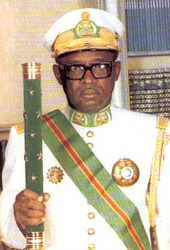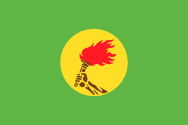Léopold Honoré Mobutu

| |
|---|---|
| Official title | Le Guide |
| Rank | 1st King of Zaïre |
| Term of Office: | March 5, 2006-present |
| Predecessor: | NA |
| Successor: | NA |
| Birthdate | November 24, 1950 |
| Place of Birth: | Léopoldville, Belgian Congo |
| Parents | Léonard and Marie Mobutu |
| Spouse | Jacqueline Mobutu |
| Children | Eugène Mobutu, Bernadette Mobutu, Jacques Mobutu, Adolphe Mobutu, François Mobutu, Laurent Mobutu |
| Profession | Statesman, soldier (holds the rank of Field marshal) |
| Political party | Mouvement Populaire de la Révolution (MPR) |
| Languages spoken | French, English, Ngbandi, Lingala |
| Religion | Kimbanguist |
| Philosophy | Mobutism |
| Degrees |
|
Maréchal Léopold Honoré Mobutu was President of Zaïre from March 5, 2006 (the day he successfully staged a coup d'état and attained power) until April 10, 2006, the day he was crowned King of Zaïre. Immediately after attaining power, he changed the name of the Democratic Republic of the Congo back to Zaïre.
Contents
Early life
Mobutu was born in Léopoldville, Belgian Congo (as it was then called) on November 24, 1950, to Léonard and Marie Mobutu. He was the youngest of 4 children, and the only one to survive past the age of 5. His father died of African trypanosomiasis just 10 days before Mobutu was born. None of his siblings were alive at the time of his birth. His mother, a stern, hard-working, overprotective, deeply religious woman, was overzealous in shielding the boy from harm, not wanting to lose him as she had lost her beloved husband and previous children. His mother was a cook employed by a sympathetic elderly Belgian couple, who took a shine to the young boy. Mobutu returned the sentiment; he was particularly fond of the old man, whom he lovingly addressed as "grand-père." As the couple was childless, they regarded Mobutu as "the grandson we never had." "Grand-père" taught the boy to read, write, and speak fluent French and at least passable Flemish. From an early age, Mobutu showed signs of being a prodigy, and excelled in school, performing far better than the supposedly superior white children, a fact which irked his teachers. Nevertheless, he was so smart he was skipped two grades (2nd and 5th grade), so he was 9 years old and in 7th grade at the time of the country's independence on June 30, 1960.
A young man
The Congo becomes independent
The Belgian Congo's debut as an independent nation was hardly peaceful. For the boy's safety, "Grand-père" arranged for the boy to be flown to Europe. Sadly, six months after Mobutu left, his mother and surrogate grandparents were killed by United Nations "peacekeepers." Both his mother and surrogate grandmother were raped and bayoneted, and his beloved "Grand-père" was shot while trying to protect them. Infuriated, Mobutu wanted to immediately return home and "destroy the savages who killed my family," but due to financial and other reasons, was unable to return. Deeply depressed, he listlessly went through life in Europe for the next several years, excelling in school and earning money by working a part-time job as a cook. He stayed at the home of "Grand-père's" nephew Jean-Claude in Brussels during those years, and saved every penny he earned so he could go to college someday.
Master student
In spite of all his hardships, including derisive taunts ridiculing him for the fate of his family, as well as racial slurs, he persevered, and graduated from high school at the top of his class in 1965. Back in the Congo, Mobutu Sese Seko (no relation) came to power via a coup (as the young Mobutu would himself do many years later). Curious as to what this meant for his country, the young Mobutu, against the advice of Jean-Claude, returned to his homeland. There, he joined the military, and served with distinction, helping to quell Lumumbist rebels. He rose rapidly in the echelons, although not for reasons he would have liked (it was because, like the new President, he was a member of the Ngbandi tribe). By 1970, the country was stable enough for young Mobutu to resume his studies, and he attended the University of Lubumbashi, where he earned an MA in History. Missing Jean-Claude, he returned to Belgium. He applied for Université Libre de Bruxelles, passed the entrance exam with flying colors, and earned an MA in Economics. Afterwards, he attended the prestigious University of Paris, where he earned a PhD in Geopolitics.
Back in the military
Shaba I
Coincidentally, the year he obtained his doctorate was the same year the Shaba I, took place, in which anti-Mobutu rebels infiltrated Shaba via Marxist Angola. He quickly resumed his military career, but the country's military, ill-trained, unmotivated, and hampered by corruption, was easily routed by the rebels. Only Mobutu's (Léopold, not the President) unit performed well, often achieving 20-1 kill ratios against the enemy with minimal losses. However, the army's performance as a whole was poor, and only French and Moroccan intervention saved the army from imminent defeat. On the plus side, young Mobutu was heavily promoted due to his excellent performance.
Shaba II
A year later, came Shaba II. Once again, Mobutu excelled, while the rest of the army was defeated with laughable ease by rebels. Again, foreign intervention was all that saved the country from defeat.
Post-military
Retirement
Shortly after attaining the rank of Lieutenant General, Mobutu retired from the military, bored with life in the barracks and sickened by the ridiculously inefficient performance of the army. Taking advantage of his degree in politics, he ran for many local elections as a member of the MPR (all Zaïreans were by law automatically members). He never won any elections, though he liked politics, and gradually developed the oratory, savvy skills, cunning tactical mind, and charisma that would help him later on. By 1990, having never won an election, he called it quits and moved to Lubumbashi, where he taught political science. He managed to survive the ordeal of rampaging and looting wreaked by unpaid soldiers when they went on the rampage in 1991 and 1993.
Enter Kabila
He continued teaching until the rebellion led by Laurent Kabila broke out. As badly as he wanted to salvage President Mobutu's faltering regime from defeat (he was a strong admirer of the President), he knew there was no chance of victory, and feared reprisal by Kabila's forces in the event that the army lost. He waited in the wings until after Kabila's victory when, with a small group of Mobutu loyalists, he staged an unsuccessful coup. After narrowly surviving several assassination attempts by Kabila's men, he fled across the river to Congo-Brazzaville, where he remained until 2006.
Rise to power
While in exile, he quietly built up a following of several thousand other exiles, who he sent across the border to recruit like-minded anti-Kabila Congolese. By 2006, with their home country still mired in war and chaos, Mobutu finally lost patience, decided President Joseph Kabila (son of Laurent, who was killed in 2001) was too incompetent to restore order to the country and, after managing to divert governmental forces to the east, he seized Kinshasa, toppled Kabila, and assumed power.
As President
Mobutu has not been in power very long. However, he has made several notable achievements so far. He has renamed the country Zaïre, revived Mobutu Sese Seko's authenticité program, the one-party state, and Zaïrianization, and is currently building his power, smashing the opposition, building a personality cult, and working to restore order to the country. He has also promoted himself to field marshal, and appointed himself President-for-Life.
As King
As mentioned previously, Mobutu is no longer President of Zaïre. Since the country's transition to a monarchy, he has been King of Zaïre.

|
Royaume de Zaïre | 
|
|---|---|---|
| Main article: Zaïre | ||
| Government: Léopold Honoré Mobutu, Victor Ngbanda, Mouvement Populaire de la Révolution | ||
| Military: Forces Armées Zaïrois | ||
| Corporations: Gécamines, MIBA, TriPetal (article by Laurasia) | ||
